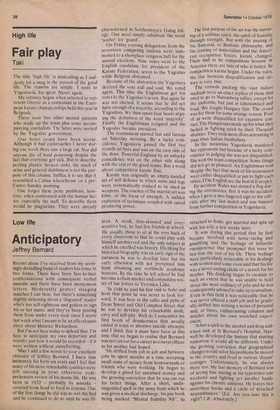High life
Fair play
Taki
The title 'high life' is misleading as I suddenly hit a snag in the pursuit of the good life. The reasons are simple. I went to Yugoslavia, for sport. Never again.
My odyssey began when selected to represent Greece as a contestant in the European karate championships held this year in Belgrade.
There were five other mental patients who made up the team plus some accompanying journalists. The latter were invited by the Yugoslav government.
Our hotel could have been worse. Although it had cockroaches I never during one week there saw a large rat. Nor did anyone die of food poisoning despite the fact that everyone got sick. But to describe peeling plaster, broken sinks, the smell of urine and general shabbiness is not the purpose of this column. Suffice it to say that it resembled a Cuban whorehouse on a preCastro Sunday morning.
One forgot these petty problems, however, when confronted with the human factor, especially the staff. To describe them would be plagiarism. They were already characterised in Solzhenitsyn's Gulag trilogy. One need simply substitute the word 'waiter' for 'guard'.
On Friday evening delegations from the seventeen competing nations were sum moned to a showplace congress hall for the annual elections. Nine votes went to the English candidate for president of the Karate Federation, seven to the Yugoslav while Belgium abstained.
Because of the abstention the Yugoslays decreed the vote null and void. We voted again. This time the Englishman got ten votes to the Yugoslav's seven. But again he was not elected. It seems that he did not have enough of a majority, according to the Yugoslays. We then spent four hours arguing the definition of the word 'majority'. Finally the Englishman resigned and the Yugoslav became president.
The tournament started fast and furious on Saturday morning. By a lucky coincidence Yugoslavia passed the first two' rounds on byes and was on the easy side of the draw. Powerful England by an unlucky coincidence Was on the other side along with the rest of the good teams. But a word about competition karate first.
Karate was originally an empty-handed art of self defence in which arms and legs were systematically trained to be used as weapons:The essence of the martial art was kime, or the focus of strength. A sudden explosion of technique coupled with speed producing power. The first purpose of the art was the nurtur ing of a sublime spirit, the spirit of humility through strength. But with the passing of the Samurai, or Bushido philosophy, and the coming of materialism and the American occupation forces, karate changed. There had to be competitions because in America there are lists of who is better. So competition karate began. Under the rules, the line between disqualification and victory is very thin. The crowds packing the vast indoor stadium were an exact replica of those that used to go to Nuremberg rallies, except for the uniforms, but just as lobotomised and o We fought Hungary first. The crowd was ud io r l of us were disqualified for excessive contact. The Hungarians made up for what they lacked in fighting spirit by their Thespian abilities. They took more dives screaming in pain than Italian footballers. In the meantime Yugoslavia murdered her opponents but because of a lucky coin cidence in judging she was not disqualified. She won the team competition. Some things did not go as planned. An Englishman won despite the fact that most of his teammates were either disqualified or put to fight each other. (The English are the best in Europe). By accident Wales was denied a flag dur ing the ceremonies. But it was no accident w gave a two-fingered sign to the officials I after my last match and was banned from further competition in Yugoslavia. l them for some strange reason. Four


































 Previous page
Previous page